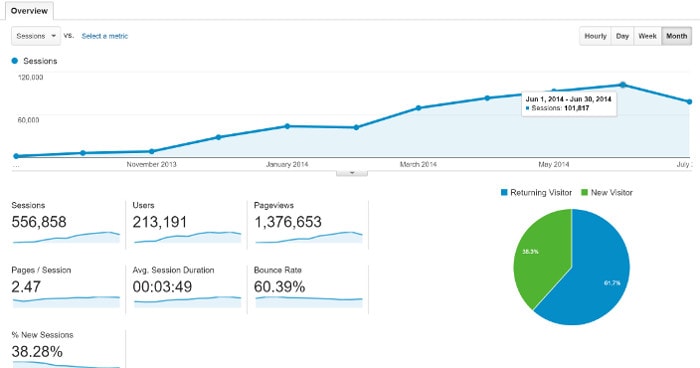The simple SEO guide here will get you farther and for less effort than other guides. In this day and age, everyone should have a basic understanding of online marketing. I think it’s important because the new economy is more about personal branding than ever before.
Here’s how I built a site that went from 0 visits to 100K visits per month in 7-8 months while giving SEO very little thought and I didn’t pay for advertising.
Results and niche
The site in question was rocketbrainsurgeon.com, a strategy website around a game called World of Tanks. Articles were 700+ words long and included at least 2 images. Often there was an associated video that was hosted on YouTube. Content was released every weekday for 7 months.

According to Google Analytics, 41% of my traffic came from Organic Search. And I did very little to earn that traffic.
Understand how organic search works
“Where do you hide a dead body? On the second page of Google’s search results” – Funny joke, but true. 97% of searches don’t get to the second page. If your average position is over 10, it might as well not be ranked at all. Page one or bust.
Rank 1 in Google still means you’re not shown on the screen for some search results – Google didn’t get to be the gigantic company that it is by giving away things for free. Ads fill the screen for most searches. Realize that all the hard work you do on SEO can still mean that you don’t even show up without scrolling!
Users click on a search result within 3 seconds – There’s 1,000+ words on the page, how to users make a choice? By skimming. Google highlights the words the user typed into the search box and people click on the results that have the most highlighted words.
Content is devalued over time because people want recent search results and not something from 2003. So all that effort you put into getting Rank 1 for your keyword needs to be maintained. Forever. The second you stop is the second your results drop.
Personalization and Localization is huge – Search engines tailor results based on things you’ve searched before and where you are located. So two people doing the exact same search will get different results. Don’t be afraid to go niche, because there are lots of people out there who want very specific content just for them.
SEO is slow, subject to the whims of the search engines, and incredibly time intensive. This article exists so we can get the biggest impact for the least effort… which still equates to a ton of effort because that’s the reality of SEO.
Basics
SEO consists of three main ideas: finding keywords, content, and on-page optimization. People more familiar with the process will notice I omitted linkbuilding, which I’ll talk about later.
Finding keywords
Reduce your broad keyword to a niche. For example, “GoPro camera” is pretty broad. The search results page will be filled. But “GoPro travel camera” will be less competitive. And phrasing it as a question, “Is the GoPro camera good for travel?” will be even less occupied. Go small. You’ll rank better and get more clicks than trying to go broad. Using the above method got me 114 clicks and 3 affiliate conversions for half an hour of effort of writing the article. And counting.
Tips to find a good keyword:
Do a Google search, and then look at the results page.
- Few to no ads (good)
- The exact search phrase doesn’t appear in bold 50+ times (better)
- The exact search phrase doesn’t appear often at all (best)
If you don’t see the exact phrase you typed in very much on the page, that’s a good keyword. Don’t stress out about how much volume this keyword gets. If the keyword is relevant to your business and you have exactly what they are looking for, there will be traffic.
But also don’t bend over backwards to get some weird phrase that no one uses. Think of normal, yet specific phrases relevant to your business.
Use the words your customers use!
Search engines are basically word-matching. If you don’t have the exact words your customers are using, you won’t show up! Don’t use business language.
Here’s how the business thinks vs a customer:
- Business: “We offer the best in outdoor simulated driving experiences!”
- Customer: “go-karts near me”
The business will never rank because when Google looks at your site for “go-karts”, it finds “simulated driving experience” instead.
On-Page optimization
Now that you have a keyword, you need to structure your page properly to make sure the search engines can see it.
General rules:
- One page, one idea – don’t try to make one page do everything
- Keyword goes at or near the start
- Keyword remains the same in every element
- Keyword is spelled correctly and in the same order each time
- Textual content starts as high on the page as you can get it: NO BIG IMAGES PUSHING CONTENT DOWN
Place your keyword in the URL, title, meta description, hero image alt text, H1, and content of the page. That’s it!
Using this page as an example: “simple-seo” is in the URL, “Simple SEO” is the title, “simple SEO” is in the meta description, “simple SEO” is in the alt text of the image, “simple SEO” is in the H1, and in the first sentence of the content. There’s no huge image taking up the screen.
Linkbuilding
Linkbuilding is the practice of pointing links towards your site to give more credibility to search engines and thus getting a higher position in the search results. These are called “backlinks”. Backlinks are so important that people even go so far as to build fake websites specifically for the purpose of gaming this system.
So how do you do it? Simple. You don’t. The only links you are interested in are ones real humans actually follow. Instead of scouring the internet looking for some obscure directory with a high PageRank (Google’s “power” rating) and begging them for a link to your site, let your audience build backlinks for you.
If your content is good, it WILL be shared. It WILL be linked.
Share your content with your Facebook friends. Share it on social media. Share it on forums. Share it on Reddit. Share it on StumbleUpon. But only put links where it adds something to the conversation. Don’t spam.
“Content is king. Context is God.” – Gary Vaynerchuck
If no one shares your content, that means it sucks. No amount of spammy backlinks would have helped you anyway because once they got to your site, they’d just leave. That’s the most important point. If your content can’t convert people, it doesn’t matter one bit that you’re Rank 1 for that keyword. If you have good content, it converts. It builds backlinks on its’ own.
According to Google Analytics, referrals and social media shares made up 36% of my traffic. I put out only one link per day, in front of people who would be interested in what I had to say.
Linkbuilding: not even once. To back up my point on this, Google will declare that links bring little to no benefit to ranking. For them to come out and acknowledge this publicly means that links have been of low to zero value for some time before this.
Common misconceptions about search
“I can get you Rank 1 in Google!” – If an agency or product says this to you, RUN AWAY AS FAST AS YOU CAN. The top ranking in the search engines doesn’t matter, you want quality traffic that converts.
How to get Rank 1 in Google:
- Optimize for gibberish or an obscure phrase. Examples: “dfuaiopr3ewjdklafd878cc” or “Pinky rings enhance pickles while playing Call of Wartoads”
- Wait
- Boom: rank 1 on Google for a phrase no one is searching for
Or, pay for AdWords advertising to get Rank 1 in Google in less than an hour.
“Organic search is free” – nothing is further from the truth. Organic search takes a lot of time and effort. An article that took 8 hours to write may only gather 10 clicks a month, and one conversion per year. And that’s after waiting two months for it to get indexed and ranked.
Instead, in that 8 hours that took you to write it, you could have worked at McDonald’s for $10/hour, made $80, and gotten 160 clicks and 2 orders in a few hours from Facebook advertising. Then you could have put that profit towards more advertising and built your business from there.
Oh, and that was one article we were talking about. To get good at organic search, you’re going to need several pieces of content every week. Organic traffic is one of the most expensive ways you can possibly advertise because of the overwhelming amount of time it takes.
“I never click on ads” – HAHAHAHAHAHAHAHAHAHAHAHAAHAHAHAHAH. People say this to me all the time, and it’s just not true. Even if you have ad blockers, you still click on ads. I click on ads. Advertising has changed, and what an “ad” can be is very fluid. The top organic results for Google might not have advertising on them directly (ie, clicking on them doesn’t give Google money for that click), but I guarantee you there’s a pile of money and effort behind that #1-3 ranking for a competitive keyword.
“Every page needs SEO” – Nope. While this page has basic SEO done to it (because it’s so easy), it’s not intended to gain traffic through organic search. It’s intended to be shared. Companies waste a lot of time SEO’ing pages that are never meant to generate traffic.
Most common failures
Poor keyword selection
Most people optimize for keywords where they have no chance, like “real estate agent”. Instead, get more specific. “real estate agent in Minneapolis” is better, but not perfect. “real estate agent in Minneapolis for single family homes” is what we’re looking for. Will something like that get a lot of traffic? No, but the traffic it does get has a high chance of conversion because it’s exactly what they are looking for. Getting 100 clicks and no conversions for the month is a failure, but getting 10 clicks and one conversion instead is a success.
Think small. Specific.
Very little content
The vast majority of businesses throw up a few pages and then never touch their site for a few years. And then they wonder why they aren’t getting traffic. You absolutely have to keep producing content if you want to rank well. Organic search is very time intensive if you want to compete for high volume keywords. Most companies discover very early that this isn’t what they signed up for and that they’d rather pay for traffic than earn traffic.
Short or copied content
An article must be 700 words or longer to rank effectively. It also must be unique. You can’t just copy from somewhere else, you have to sit down and write it. Don’t believe the people that say programs can write unique content that will evade search engines.
Summary
SEO is much easier than most people make it out to be. Yes there are things you can and should do to help search engines find your content. But it doesn’t replace great content. Spend your time creating content people love, and everything will grow from there.


Pretty solid stuff. Thanks!